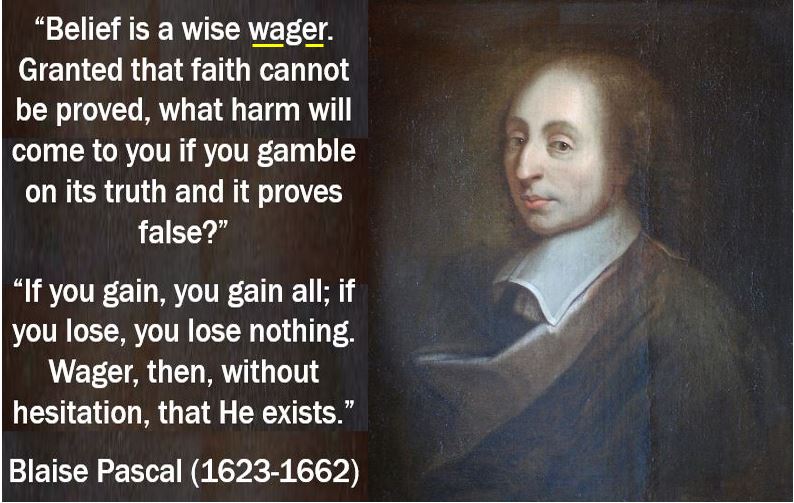Wager can be either a verb or a noun.
As a noun, it is a sum of money that an individual risks in the hope of winning more – it is a bet. If you try to guess something uncertain, and put money down, betting that if it happens you get a reward – such as more money – the money that you bet is a wager.
Below are some examples:
– “I put a cash wager of $100 on the horse race.”
– “They tried to eat 100 sausages in 30 minutes for a wager.”
As a verb, it means to risk money by guessing what will happen, i.e. to bet. For example:
– “Billions of dollars are wagered on sports event each year.”
– “The world champion was so sure that he would win again that he wagered on himself.”
 Blaise Pascal (1623-1662) was a French physicist, mathematician, Catholic theologian, writer and inventor. His father, a tax collector in Rouen, educated Pascal – his ‘child prodigy’ – at home. Pascal made important contributions to the study of fluids, and clarified the concepts of vacuum and pressure. (Image: adapted from Wikipedia)
Blaise Pascal (1623-1662) was a French physicist, mathematician, Catholic theologian, writer and inventor. His father, a tax collector in Rouen, educated Pascal – his ‘child prodigy’ – at home. Pascal made important contributions to the study of fluids, and clarified the concepts of vacuum and pressure. (Image: adapted from Wikipedia)
Etymology of ‘wager’
Etymology is the origin of words, and how their meanings have changed throughout history. Somebody who specializes in etymology is an etymologist.
According to etymonline.com, the word Wajour appeared in the British Isles in the thirteen hundreds meaning ‘a vow, a promise, something sworn to, something pledged’, as well as ‘stakes, something laid down as a bet, a bet.’
The term came from Anglo-French Wageure, Old North French Wagiere, meaning ‘pledge, security’. It then turned into Wagier.
A type of contract
The Law Dictionary defines a wager as a type of contract:
“A wager is a contract by which two or more parties agree that a certain sum of money or other thing shall be paid or delivered to one of them on the happening of an uncertain event or upon the ascertainment of a fact which is in dispute between them.”
“…A contract in which the parties stipulate that they shall gain or lose upon the happening of an uncertain event in which they have no interest, except that arising from the possibility of such gain or loss.”
